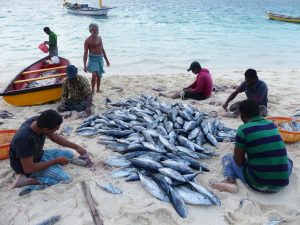
Blue Economy is an omnibus term for all economic sectors with a direct or indirect link to the ocean. In 2016, OECD projected that by 2030, the Blue Economy could outperform the growth of the global economy as a whole. In various formulations, this includes both old uses of coastal and marine resources (food provisioning, marine transport and infrastructure, energy production, extraction and tourism) and emerging industries (for example, marine biotechnology, seabed mining and carbon sequestration).
The importance of oceans to sustainable development has always been recognized in international processes. Concern for the deteriorating health of oceans culminated in a dedicated goal to conserve and sustainably use marine resources in the 2030 Agenda for Sustainable Development.
Fishworkers’ and civil society organizations have advocated for a transformation of the Blue Economy or Blue Growth discourse. They seek the recognition of the contributions of small-scale fisheries (SSF) to the global economy and well-being. They demand the prevention of inequitable marine resource management and investments in large-scale infrastructure and destructive industries.
This campaign call for placing SSF at the heart of all discussions on the future of oceans and inland waters, be it management of economic planning. They seek the active participation of fishing communities in all decision making, with special attention to women, indigenous groups and other vulnerable people of these communities.
The Justice in the Blue Economy campaign is informed by an approach based on universal human rights. It argues for democratic consultation with fishing communities, gender equity as an outcome of policy and programmes, and the accountability of public and private institutions.
For more details, please visit: https://www.icsf.net/campaign/